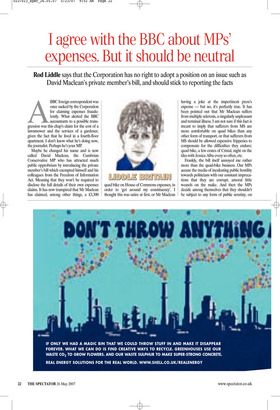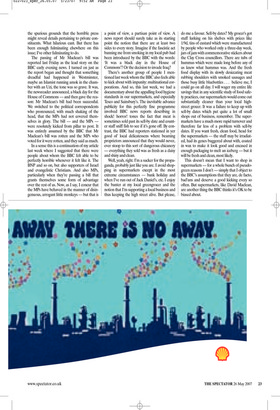I agree with the BBC about MPs’
expenses. But it should be neutral Rod Liddle says that the Corporation has no right to adopt a position on an issue such as David Maclean’s private member’s bill, and should stick to reporting the facts ABBC foreign correspondent was once sacked by the Corporation for claiming expenses fraudulently. What alerted the BBC accountants to a possible transgression was this chap’s claim for the cost of a lawnmower and the services of a gardener, given the fact that he lived in a fourth-floor apartment. I don’t know what he’s doing now, the journalist. Perhaps he’s your MP.
Maybe he changed his name and is now called David Maclean, the Cumbrian Conservative MP who has attracted much public opprobrium by introducing the private member’s bill which exempted himself and his colleagues from the Freedom of Information Act. Meaning that they won’t be required to disclose the full details of their own expenses claims. It has now transpired that Mr Maclean has claimed, among other things, a £3,300 quad bike on House of Commons expenses, in order to ‘get around my constituency’. I thought this was satire at first, or Mr Maclean having a joke at the impertinent press’s expense — but no, it’s perfectly true. It has been pointed out that Mr Maclean suffers from multiple sclerosis, a singularly unpleasant and terminal illness. I am not sure if this fact is meant to imply that sufferers from MS are more comfortable on quad bikes than any other form of transport, or that sufferers from MS should be allowed expensive fripperies to compensate for the difficulties they endure; quad bike, a few crates of Cristal, night on the tiles with Jessica Alba every so often, etc.
Frankly, the bill itself annoyed me rather more than the quad-bike business. Our MPs accuse the media of inculcating public hostility towards politicians with our constant imprecations that they are corrupt, amoral little weasels on the make. And then the MPs decide among themselves that they shouldn’t be subject to any form of public scrutiny, on the spurious grounds that the horrible press might reveal details pertaining to private constituents. What hilarious cant. But there has been enough fulminating elsewhere on this issue; I’ve other fulminating to do.
The passing of Mr Maclean’s bill was reported last Friday as the lead story on the BBC early evening news. I turned on just as the report began and thought that something dreadful had happened in Westminster, maybe an Islamist running amok in the chamber with an Uzi, the tone was so grave. It was, the newsreader announced, a black day for the House of Commons — and then gave the reason: Mr Maclean’s bill had been successful. We switched to the political correspondents who pronounced, with much shaking of the head, that the MPs had not covered themselves in glory. The bill — and the MPs were resolutely kicked from pillar to post. It was entirely assumed by the BBC that Mr Maclean’s bill was rotten and the MPs who voted for it were rotten, and they said as much.
In a sense this is a continuation of my article last week where I suggested that there were people about whom the BBC felt able to be perfectly horrible whenever it felt like it. The BNP and so on, but also supporters of Israel and evangelistic Christians. And also MPs, particularly when they’re passing a bill that grants themselves some form of advantage over the rest of us. Now, as I say, I concur that the MPs have behaved in the manner of disingenuous, arrogant little monkeys — but that is a point of view, a partisan point of view. A news report should surely take as its starting point the notion that there are at least two sides to every story. Imagine if the fascistic act banning me from smoking in my local pub had been introduced by the BBC with the words: ‘It was a black day in the House of Commons’? Or the decision to invade Iraq?
There’s another group of people I mentioned last week whom the BBC also feels able to kick about with impunity: multinational corporations. And so, this last week, we had a documentary about the appalling food hygiene standards in our supermarkets, and especially Tesco and Sainsbury’s. The inevitable advance publicity for this perfectly fine programme involved BBC news reports describing in shock! horror! tones the fact that meat is sometimes sold past its sell-by date and counter staff sniff fish to see if it’s gone off. By contrast, the BBC had reporters stationed in yer good ol’ local delicatessens where beaming proprietors announced that they would never, ever stoop to this sort of dangerous chicanery — everything they sold was as fresh as a daisy and shiny and clean.
Well, yeah, right. I’m a sucker for the propaganda, probably just like you are. I avoid shopping in supermarkets except in the most extreme circumstances — bank holiday and when I’ve run out of Jack Daniel’s, etc. I enjoy the banter at my local greengrocer and the notion that I’m supporting a local business and thus keeping the high street alive. But please, do me a favour. Sell-by dates? My grocer’s got stuff lurking on his shelves with prices like 1/9d, tins of custard which were manufactured by people who worked only a three-day week, jars of jam with commemorative stickers about the Clay Cross councillors. There are tubs of hummus which were made long before any of us knew what hummus was. And the fresh food display with its slowly desiccating meat rubbing shoulders with smoked sausages and those busy little bluebottles ... believe me, I could go on all day. I will wager my entire life savings that in any scientific study of food safety practices, our supermarkets would come out substantially cleaner than your local highstreet grocer. It was a failure to keep up with sell-by dates which put quite a lot of small shops out of business, remember. The supermarkets have a much more rapid turnover and therefore far less of a problem with sell-by dates. If you want fresh, clean food, head for the supermarkets — the stuff may be irradiated, had its genes buggered about with, coated in wax to make it look good and encased in enough packaging to melt an iceberg — but it will be fresh and clean, most likely.
This doesn’t mean that I want to shop in supermarkets — for a whole bunch of pseudogreen reasons I don’t — simply that I object to the BBC’s assumptions that they are, de facto, bad’uns and deserve a good kicking every so often. But supermarkets, like David Maclean, are another thing the BBC thinks it’s OK to be biased about.



















































































 Previous page
Previous page